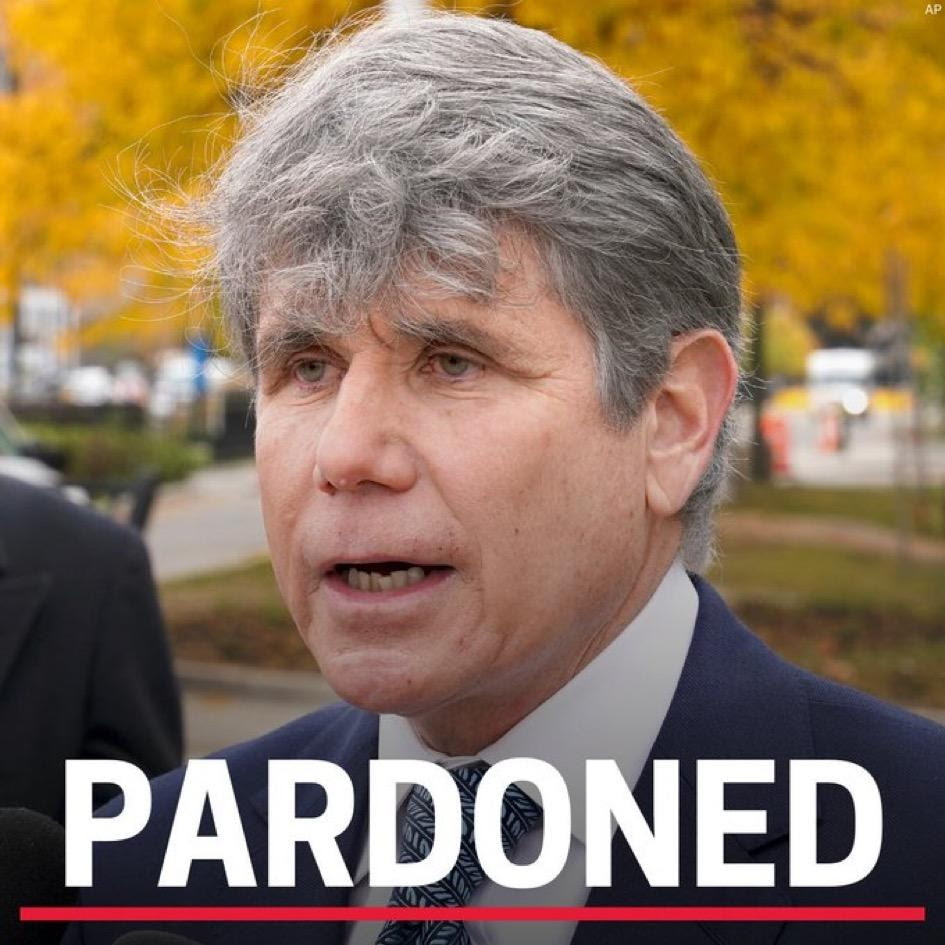President Donald Trump recently gave former Governor Rod Blagojevich a full pardon. He was a popular governor. What did he do to go to jail like no other politician did? He talked too much as the feds listened. Rod was responsible for appointing a United States senator to the vacant post of the seat left by President Barack Obama. Blagojevich could appoint a Senator. He had a powerful seat.
Rod Blagojevich, however, saw this opportunity as a way to gain personal benefit rather than serving the public interest. Federal prosecutors accused him of attempting to sell or trade the Senate seat for financial and political favors. His actions were considered unethical and illegal, leading to his arrest in December 2008. No money was ever exchanged. Despite his initial claims of innocence and accusations of political persecution, the evidence against him was extensive, including recorded FBI conversations where he was caught discussing ways to profit from the appointment. These events ultimately led to his trial and conviction on corruption charges, resulting in a 14-year prison sentence.
He considered many. And many lobbied for the position. The Obama campaign suggested Valerie Jarrett. Senator Dick Durbin suggested Lisa Madigan. Then, Congressman Jesse Jackson was considered. Emil Jones was considered. Governor J.B. Pritzker was even considered. However, he was not interested in being a senator. However, he strongly recommended Jesse White because he was “least offensive” than other African Americans being considered. Interestingly, after the Democratic leadership (Durbin and Quinn) tried to destroy Roland Burris for taking the seat after they told him not to accept it. The senatorial selection saga was a case of strange politics as the power brokers played.
“The Commutation…

Rod Blagojevich served eight years of his 14-year sentence before receiving a commutation from President Trump in February 2020. This decision sparked mixed reactions across the political landscape.
Supporters of the commutation argued that the original sentence was excessively harsh for the crime committed, citing other politicians who faced lighter consequences for similar offenses. Critics, however, contended that reducing his sentence undermined efforts to combat political corruption and sent the wrong message about accountability for public officials.
His early release in 2020, following President Trump’s pardon, reignited the debate. Supporters of the pardon praised it as an act of mercy, allowing Blagojevich to reunite with his family and rebuild his life. Critics viewed it as undermining efforts to hold politicians accountable and setting a dangerous precedent for excusing unethical behavior.
Regardless of perspective, Blagojevich’s saga remains a poignant reminder of the complexities of law, morality, and the responsibilities of public office.
Blagojevich’s case became a political spectacle, drawing significant media attention due to the high-profile individuals involved and the allegations of blatant corruption. The recordings released during the investigation revealed Blagojevich’s crude language and brazen approach to leveraging his gubernatorial powers for personal gain. He famously referred to the Senate seat as “f***ing golden” and lamented the idea of giving it away for nothing.
Despite his conviction, Blagojevich maintained that he was a victim of an unfair judicial process. His commutation by President Trump in February 2020 reignited debates about corruption, accountability, and the extent of executive power. While some saw the commutation as an act of justice for a punishment they deemed excessive, others criticized it as undermining the fight against political corruption. Today, Blagojevich remains controversial, embodying the complexities of power, ethics, and law in American politics. However, to this day, his political mishaps are minor.
After his conviction, Blagojevich spent eight years in federal prison before President Trump commuted his sentence in 2020. His release reignited debates over corruption, accountability, and the use of clemency powers. While some viewed Trump’s decision as an act of mercy for a former public servant, others criticized it as undermining the justice served through his conviction. Upon his release, Blagojevich maintained his innocence and expressed gratitude for the opportunity to rebuild his life.
Blagojevich commented that he had a golden goose, and he suggested he wanted to be rewarded for the appointment. Talk, Talk, Talk. Jibberish. Political talk. He finally appointed the best person for the job, with Roland Burris. He was indeed Mr. Clean Cut. Blajojevich spoke out of turn, indeed. But he did not deserve a jail sentence of 13 years.
Blagojevich’s Story

Blagojevich’s story also underscores the complexities of balancing justice and mercy. While some believe his long sentence was disproportionate and motivated by political agendas, others emphasize its importance in upholding accountability. His commutation sparked fears among critics that it could send the wrong message, potentially encouraging corrupt practices by undermining the moral and legal precedents meant to discourage them. However, his case remains a cautionary tale — a reminder of how personal ambition, unchecked by ethical considerations, can lead to catastrophic consequences for both individuals and public institutions.
We may never know the real backroom stories, but he fell out of favor with his father-in-law, former Alderman Dick Mell, and many think Rod was punished for ill deeds or political mishaps. Blagojevich experienced terrible things along the way, but he also experienced good things. He was a contestant on “The Apprentice Show” and met Donald Trump, who liked him.
Patti Blagojevich was diligent in her efforts to get her husband’s sentence excommunicated. She appealed to many. Trump requested that if Rev. Jesse Jackson wrote a letter on his behalf, he would consider it. They made their case for Blagojevich’s pardon in a letter that was published in the Wall Street Journal.

Finally, in 2025, the full, absolute pardon was granted, and Blagojevich was restored. He can now proceed with a better life.
He will now receive his pension from the State of Illinois and perhaps we will see him as the Ambassador of his homeland, Syria.
And maybe he will write a letter to help secure a pardon for Jesse Jackson, Jr. Politics is funny, as it makes strange bedfellows indeed. You have to put politics in historical context, asking the question, compared to what?







